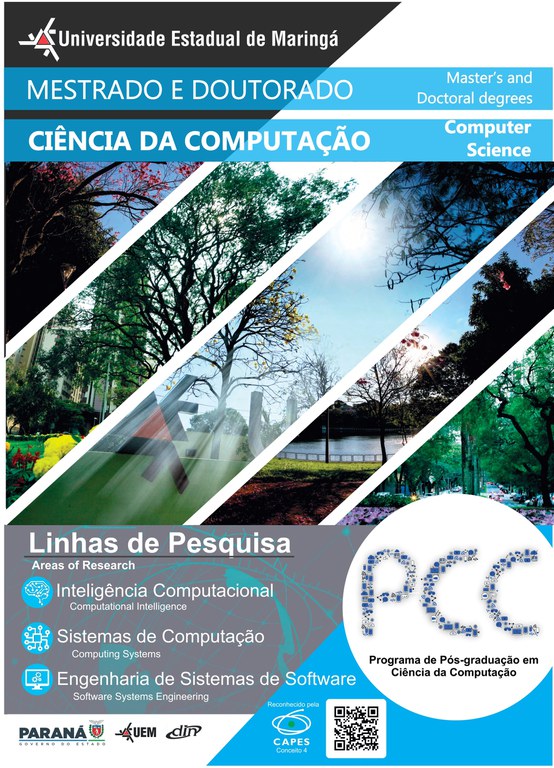Website in English
Areas of Research
PCC's Master's and Doctoral courses are developed in three lines of research.
Computational Intelligence
This line involves research on computational intelligence techniques for the development of decision support systems applied to real problems, covering: evolutionary computing, machine learning, natural language processing, image processing, bio-inspired algorithms, computer vision, applied optimization, fuzzy logic, pattern recognition, operations research, deep learning, recommender systems, website personalization, and web data mining.
Computer Systems
This line jointly involves the study and development of algorithms and architectures to support the creation of computing systems. The line covers Internet of Things (IoT) contexts, wireless sensor networks, computer networks, embedded systems, robotics (modeling, control and navigation), parallel programming, computer architecture, compilers, programming languages and teaching-learning using robotics.
Software Systems Engineering
This line involves investigations into techniques to support the production of software, emphasizing the improvement of the quality of products and processes. The line aims to provide researchers with solid technical knowledge in Software Engineering, enabling them to analyze, propose solutions and manage the process of building and adopting computerized systems in a work, teaching and learning environment. This line covers advanced methods of software engineering, software product and process line, evidence-based software engineering, software engineering education, distributed software development, free software development, software project management, software process, mining of software repositories, and search-based software engineering.
About PCC
Presentation
Maringá, located in the northwest of the State of Paraná, is known for its intense green streets and avenues. The city offers excellent quality of life and infrastructure.
Within this context, the State University of Maringá (UEM) emerges as a cultural and technological hub of an entire region that reaches more than 100 municipalities in the microregions of Maringá, Paranavaí, Umuarama, Cianorte, Campo Mourão, Apucarana and Ivaiporã.
The Graduate Program in Computer Science (PCC) is linked to the Department of Informatics (DIN), which belongs to the Technology Center (CTC). DIN offers: graduate courses in Computer Science (academic master's and doctorate); undergraduate courses in Computer Science (full-time) and Informatics (evening), and a non-degree graduate course in Web Systems Development.
The Master's and Doctoral courses in Computer Science are recognized by CAPES, and obtained grade 4 in the last evaluation. The master's and doctoral courses began in 2002 and 2021, respectively, and have already titled more than 230 academics by June 2021.
Goals
The PCC is excited to:
- to provide graduate students with in-depth knowledge in the area of Computing, which allows them to achieve a high standard of scientific or technical-professional competence;
- to offer, within the UEM, adequate environment and resources for the development of scientific research in the area of Computing;
- to train qualified personnel for the exercise of higher teaching activities in the area of Computing;
- prepare researchers who advance technological development in the area of Computing; and
- to train highly qualified professionals in the area of Computing.
Administrative Staff
Director: Profª Thelma Elita Colanzi Lopes
e-mail: teclopes at uem.br
telefone: (44) 3011-5118
Assistant Director: Profª Valéria Delisandra Feltrim
e-mail: vdfeltrim at uem.br
telefone: (44) 3011-5109
Secretary: Aparecida Lourenço de Jesus Alves
e-mail: sec-pcc at uem.br
telefone: (44) 3011-4345
Research Laboratories
DIN has the following research laboratories:
- Algorithm Engineering Laboratory (LEAL);
- Laboratory of Intelligent Interactive Systems (LSII);
- Software Engineering Laboratory (LES);
- Data Management Laboratory (LGD);
- Information Technology Laboratory (LTI);
- Distributed Software Development Laboratory (LDDS);
- Experimental Laboratory of High Performance Computing (LECAD);
- Languages, Compilers and Parallel Programming Laboratory (LCP);
- Laboratory of Embedded Systems and Communications (LSEC);
- Information Security Laboratory (LASI); and
- Ubiquitous and Autonomic Computer Engineering Laboratory (MANNA).
Logo
The PCC logo was created in 2021 by Lucas Ken Higashi and Beatriz Sayuri Endo, then students of the Communication and Multimedia course at UEM. Luke describes the symbol as follows:
"The symbol represents connectivity and union, just like for computers in which all parts need to be connected to work correctly. It presents elements of the printed circuit board that are very present in Computer Science, placed in a way to form a hexagon and creating the idea of movement. It also includes a notebook on the side, showing that this area does not only work with the hardware but also with the software, the graphical interfaces and the user experience. Overall it presents a modern and geometric look as it is an area who works with technology and many calculations, is a symbol that represents modernity, connectivity and technology."










